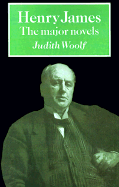Book contents
- Frontmatter
- Contents
- Acknowledgements
- A brief life of Henry James
- Bibliographical note
- 1 Introduction
- 2 The Europeans, Washington Square, Daisy Miller
- 3 The Portrait of a Lady
- 4 The Bostonians
- 5 What Maisie Knew
- 6 The Awkward Age, The Ambassadors
- 7 The Wings of the Dove
- 8 The Golden Bowl
- 9 Afterword
- Select bibliography
6 - The Awkward Age, The Ambassadors
Published online by Cambridge University Press: 01 June 2011
- Frontmatter
- Contents
- Acknowledgements
- A brief life of Henry James
- Bibliographical note
- 1 Introduction
- 2 The Europeans, Washington Square, Daisy Miller
- 3 The Portrait of a Lady
- 4 The Bostonians
- 5 What Maisie Knew
- 6 The Awkward Age, The Ambassadors
- 7 The Wings of the Dove
- 8 The Golden Bowl
- 9 Afterword
- Select bibliography
Summary
In the first of his three great last novels, The Ambassadors, James returned to material that he had first used in a curious experimental novel written as a companion-piece to What Maisie Knew. The plot of The Awkward Age hinges on the return to the metropolis of an elderly man after thirty years of nursing a broken heart in the country and his being caught up, through the power of old associations, into a society of corrupt beautiful people. At the centre of that society is Mrs Brookenham, a devious enchantress, still, ‘in her forty-first year’, deceptively pretty:
She had about her the pure light of youth – would always have it; her head, her figure, her flexibility, her flickering colour, her lovely silly eyes, her natural quavering tone, all played together toward this effect by some trick that had never yet been exposed.
(Bk 11 ch. 1)It is Mrs Brookenham's daughter Nanda, at eighteen the image of her dead grandmother, the beautiful Lady Julia he had long ago loved and lost, who attracts Mr Longdon's interest. Poor Nanda, guileless and innocent and far too young for her age, has all the same been tainted by the scandalous adult conversation which, banished far past the proper age to the schoolroom, she has in theory been protected from hearing. The devastating effect of this contamination on the poor girl's marriage prospects is compounded by her choosing to fall hopelessly in love with the man that her quietly rapacious mother also wants for herself.
- Type
- Chapter
- Information
- Henry JamesThe Major Novels, pp. 83 - 102Publisher: Cambridge University PressPrint publication year: 1991



